Rebellion's Fury Read online
Page 25
He reached out, struggling against his resistance, and picked up the small pill. He was dead anyway, he told himself. The only difference was the amount of pain, the days of torment that surely lay ahead. It was a mathematical equation, one beyond question, but now he found even a few extra moments of life were precious. It was one thing to contemplate suicide, to plan it, and quite another to actually do it. To say, Now, this is the moment I will die.
He longed to wait, but he didn’t have time. The guards would be back soon to take his tray. Or even sooner if they’re monitoring me in here. He wondered whether they could revive him if they found him soon enough, even after he’d taken the pill. Every second he delayed lessened his chances of succeeding. Of escaping the agony.
Of saving his daughter.
He took a deep breath and he shoved the pill in his mouth. He held it there for a few seconds, an acid taste on his tongue as it began to dissolve. He pulled together all his strength, his courage . . . and then he heard sounds outside.
The guards!
He swallowed, a panicked reaction to the noise in the corridor. It was quick, almost merciful in its lack of forethought. It was done. Now all he could do was wait, and see how long Asha’s poison took.
He felt a wave of light-headedness, even as he heard the door start to open. It is quick. It was painless, too.
He could feel himself floating away, drifting into nothingness, the vague feeling of the guards’ hands on his arms, and then nothing at all.
Chapter 30
Northern Edge of the Green Hill Forest
118 Kilometers Northwest of Landfall
Federal Colony Alpha-2, Epsilon Eridani II (Haven)
“Hold!” The sentry’s voice rang out in the crisp, cold morning air. They were challenging the approaching group of ragged-looking fighters, but if Patrick Killian and his small band had been enemies, the guard and his three comrades, all of whom Killian had spotted a hundred meters farther back, would be dead.
“Hold this, you young pup. You go and tell General Ward that Colonel Killian is here and needs to see him. Now.”
Killian walked down the center of the path, what passed for the road leading into the army’s camp. He was careful to stand in the middle of the open area, no more than a two-meter-wide dirt road, gesturing for his comrades to do the same. He didn’t need a nervous guard shooting at him . . . mostly because he didn’t want to have to kill the sentries.
“Stop where you are and hold your arms out where we can see them, all of you.”
Killian sighed as he stopped, watching as two of the guards rushed forward, guns at the ready. They moved up closer to him, and as they did, he noticed they were sharper than he’d expected, and the two they’d left behind were covering them. This wasn’t the army Killian had seen evacuate Landfall, and he suspected it wasn’t the force that had been beaten so badly the previous fall. He and his people had fought—and paid a terrible price—to buy Damian time, and it appeared the rebel general had not wasted that respite.
“Drop your weapons now, sir.”
Killian was impressed. The caution of disarming the as-yet-unidentified arrivals, and the care to call him “sir,” in case he was who he’d said he was.
“That will not be necessary, Corporal.”
Killian recognized the voice at once. He waited while the soldier acknowledged and took a step back. Then he said, “Well, if it isn’t Ben Withers. I’m not sure how an old fossil like you made it through this winter.”
“If you haven’t noticed, the one thing we have in abundance is trees, Pat. And trees burn.”
“That they do. I need to see the General.” A pause, then, “He’s . . .”
“Yes, he’s fine. Despite his tendency to wander off without any guards. Come with me. I think he’s in the main HQ shelter right now.”
Killian walked up toward Withers, giving a quick nod to the guards as he passed. They’d earned it.
“My God, I’m glad to see you, Patrick. I’d just about given up on you two days ago when Des Black walked in here with seven of his people. They’re the last ones we’ve seen, at least until your group walked up the road.”
“It’s good to see you, too, Damian . . . General.”
“Damian’s fine. I think military formality can stand aside for a minute when old friends get together.”
“How many, Damian?”
Damian looked back as though he was confused, but he knew just what Killian was asking.
“How many of my people made it back?” Damian expected he was ready for bad news, but he wasn’t sure how bad.
“Ninety-two,” he said. “Including you and the eleven who just got here with you.”
“Ninety-two?” Killian looked stricken. “That’s less than a tenth of what I started with.”
“I’m sure there are more, Patrick. Some of them probably ran off in different directions. Maybe some even snuck away and went home.” He hoped his tone sounded like he believed that more than he did, but a quick look at Killian suggested neither of them was fooled.
“What do you think of a commander who survives when more than 90 percent of his soldiers died?” Killian’s tone was deadpan, almost emotionless, but Damian knew his friend was hurting.
“In this case, I think he’s a goddamn hero that saved the rebellion. Patrick, if you hadn’t kept the federals so occupied—and I still have no idea how you managed that—they’d have marched north long ago. And if they’d caught us right after the fight at Dover, we’d all be hanging from a gallows, or worse. You did an amazing job, and the soldiers you lost are heroes of the Haven Republic.”
“They are, at least.”
“Trust me—so are you. Our losses would have been ten times higher if the feds had caught the army when it was retreating from Dover. And we’ve used the respite well. Our numbers have dwindled, but the soldiers are hardened now and well drilled. I like to think many of them are a match for federal regulars now, or at least close to it.”
“The sentries looked sharp, Damian. I noticed that right away.” Killian sighed. “Well, I hope you’re right, and I hope that these soldiers of ours are ready. Because there’s nothing stopping the federals from marching up here now. We’re going to have a fight on our hands, and probably sooner rather than later.”
Damian turned and exchanged glances with Withers and the other officers present. “I’m counting on that, Patrick,” he said a few seconds later. “In fact, I’m wondering how you’d feel about provoking them a bit, jamming a stick into Semmes’s ass until he gets pissed enough to come at us.”
“I’m not sure I understand, General.”
“Oh, you will, Patrick. You will. We’ve been doing more than training up here, thanks to Dr. Holcomb.” Damian smiled. “We’ve spent enough time hiding.”
“Are your people ready?” Damian was walking through the woods, with Jamie Grant next to him. The two were alone, perhaps a hundred meters from the camp perimeter. Even here, Damian could hear the sounds of his people tearing down everything portable. This had been the army’s home for almost six months, its refuge. His people had come here disordered, defeated, demoralized, but the brutality of winter, and the effort he and his officers had put into training, had forged that rebel force into a real army. This land—Tucker’s Glade, the few locals had told him it was called—would become a sacred place if Haven won its independence. He imagined children, generations distant, coming here, visiting a park and learning of how Haven became a republic. Then he shook the thought from his head. It was a pleasant daydream, but not one he had time for. If it was to become a reality, he still had a tremendous amount to do.
“Define ready.” Grant laughed. “Yes, they’re ready. Do I wish we had more time? Yes, absolutely. It’s damned hard to work those suits. But I’m confident we can bring hell to the feds with these things.”
“Confidence is good. I’ll admit I was far from confident we’d even have the armor—it’s a miracle we were able to produce them at all
. We can thank John Danforth for that.” Haven’s president had found all the raw materials needed. Somehow. Damian still didn’t quite understand, and the whole effort reminded him just how much support his people had planetwide. Men and women beyond those openly declared for rebellion had taken great risks to send shipments of supplies to the army, uranium and heavy metals and the other hard-to-find items required. Much of the uranium and plutonium was scavenged piecemeal from equipment that used the radioactive decay as a backup power source, and Damian had no doubt more than one vital machine had been torn apart to gain the materials Holcomb had needed. Sacrifice and devotion to the rebellion came in more varieties than just military service.
When it was all done, Holcomb and his team of engineers, technicians, and factory workers had built 302 of the suits. Minus three discarded as defective and two burned out in testing, that meant Jamie Grant would be leading 296 armored soldiers.
Multiply that by the five thousand cartridge magazines the autocannons had, and that was a lot of bullets to find federal soldiers.
The two men walked for a moment, silent. Then Grant said, “This is it, isn’t it, Damian? I know you want a victory, something to help gain the support of the other powers. But it’s more than that. If we don’t win this fight, it’s over. Isn’t it.”
Damian felt the urge to deny what Jamie had just said, to tell his friend there would be other chances. But Grant deserved the truth. “Yes, Jamie. If we can’t defeat them now, after all the drilling and with the suits as a surprise, I don’t see how a beaten, weakened army can do any better. Another federal victory will also help eliminate whatever good was done by Killian’s raids. The senate won’t pull the plug if they think they’re on the verge of winning. We need to let them know that despite the trillions of credits they have poured into this war, we’re still here, in the field, and able to beat the best they can send. It’s all or nothing now.”
“That’s how I saw it, too.” Another stretch of silence, and then Grant stopped and turned to face his companion. “I won’t let you down, Damian. You’re the best friend I’ve ever had. You gave me my life. I’d be dead in that mine without you.”
“Jamie, you’re a good man, one I’m proud to have as a friend. But you gave yourself your life back. You endured a hell most men couldn’t imagine, somehow didn’t let it destroy you, and pulled yourself out of that mine. All I did was make sure you didn’t fall back in again.” Damian took a deep breath and put his hand on his friend’s shoulder. “I’m proud of you, Jamie. Now go—we’re marching at dawn, but that still leaves tonight. You’ve done all you can to get your soldiers ready. Take these few hours, go see Katia.”
Grant nodded. “Thank you, Damian. I would like that.” Grant stood there for a moment, and then he turned and walked back toward the camp.
Yes, go see Katia. While you can. Because there’s a good chance your friend who saved you from prison is about to send you to your death.
It had been more than a year, considerably more now, and thoughts like that still haunted him. Every decision, every instant of command—they lingered with him and probably always would. How many people—friends, loyal followers—could one man send to their deaths before everything that made him who he was died, as well?
That’s assuming, of course, it hadn’t died a long time ago.
“The scouts are reporting massive movement up from Landfall.”
Damian sat in the headquarters tent, looking out at his officers. They were seated at a makeshift table, really just some boards from packing crates, nailed together and thrown on top of a couple of large barrels.
“It looks like your plan worked, sir.” Luci Morgan spoke calmly, but her face couldn’t hide her uncertainty. The army had marched all the way down to Dover, the place from which they’d retreated the year before in such haste and disorder. But Damian hadn’t left it at that. He’d sent Patrick Killian out with what remained of his rangers, plus another several hundred of his top veterans, to find federal patrols or supply convoys and ambush them. He wasn’t leaving anything to chance, in case advancing to within just over forty-five kilometers of the capital wasn’t provocation enough to stir Robert Semmes.
He’d felt terrible about sending Killian back out so soon, after all the colonel had been through. But he understood the man—at least, he thought he did—and on some level, it was a mercy to keep Killian busy. His friend was a tortured soul, even before he’d lost more than 90 percent of his forces. At least hunting federals gave him a purpose, and a distraction from the ghosts that haunted him.
“Yes, Colonel. Now we’ll see just how wise it was to poke a tiger.” Damian was edgy. They all were. He knew luring the federals in, springing Grant’s new corps on them by surprise, was the best chance of scoring the victory he needed. But it was far from certain, and even if his forces won, it wouldn’t be the end of the rebellion. It would only mean it wasn’t the end of the rebels. The true fruits of victory could only be realized by somehow getting Andrei Kutusov back to Earth. Sasha Nerov had given him bold assurances that she’d get the ambassador past the federal blockade . . . somehow. But “somehow” was far from convincing enough to get the Union ambassador to risk his life on what could charitably be described as a coin toss.
That was tomorrow’s problem. Today’s was securing the victory that even made Kutusov’s transit an issue.
He’d planned out the battle carefully, meticulously. No detail had been too small to obsess over. The key was pulling the federals in, even as his army feigned withdrawal. Then Grant’s armored troopers would strike from the flank, almost from behind, just as the rest of the army launched a massive counterattack.
It all looked good, on paper at least. It should work, by the science of war, by every maxim of combat planning. The shock of an inexplicable attack, by forces as bizarre and unexplainable as Grant’s massive armored soldiers, should break even federal regulars.
But “should” was not “will,” and Damian knew that well. A hero officer making a key stand, rallying troops, a wave of contagious bravery, a foul-up among his own troops, the unknowns of Holcomb’s new weapons—there were countless ways things could go wrong, and any one of them could turn vital triumph into disastrous defeat.
There was nothing more to be done now save fight. No use for worry and second-guessing. He had done all he could.
The die was cast.
Chapter 31
Intersection of Tillis and Sanderson Roads
Just Outside Dover, 46 Kilometers North of Landfall
Federal Colony Alpha-2, Epsilon Eridani II (Haven)
The Third Battle of Dover—The Opening
“Let’s go! Those feds are right behind us.” Patrick Killian raced along the rough gravel path—the Sanderson Road wasn’t paved north of the Tillis intersection—his rifle in his hand. He felt alive, excited, the tension of impending battle driving away the morose feelings that had taken him in his quiet moments.
He’d done all Damian had asked of him, ambushed half a dozen federal parties, and he’d managed to keep his losses to a minimum. Every casualty hurt, but he couldn’t help but feel relief that 274 of the 290 troopers he’d led south five days before were returning with him.
He ducked, more instinctively than out of any real belief that it would do any good. The fire wasn’t heavy, and it wasn’t aimed either, but it only took one lucky shot to do the job.
Killian felt good that he’d come through for Damian, that he’d done what the general had needed of him. He intended to edit his report, though, to leave out some descriptions of just how he’d handled the federal troops he’d encountered—and especially the way he had disposed of the squad of Peacekeepers he’d run into. The bastards had still had the booty from the farmhouse they’d raided, and the blood of their victims was still wet on their boots and gloves. At least that group of federal thugs had murdered their last civilians.
Killian turned and looked back. He was near the end of his column, but there were a few
stragglers behind. As he was looking, one of them pitched forward, falling to the ground. The soldier next to the stricken man slowed to stop, but Killian shouted, “Keep going! I’ll take care of this.”
He dropped next to the wounded soldier. His eyes darted to the wound. Thigh. It could be bad, but probably wasn’t fatal, not as long as he could get the man back behind the lines.
He’s not gonna walk, though, not even leaning on someone.
He looked up toward the standing soldier who still hadn’t followed his order to move. “Take this . . . and get the hell back to the lines. Now!” He handed the trooper his rifle, and then he reached down, slipping his arms under the wounded soldier. He took a deep breath and pulled the man up, thrusting his legs hard to get back to his feet. He grunted loudly, and his legs wobbled for an instant before stabilizing.
It’s never the small ones . . .
He stumbled back toward the line again, following the other soldier. It wasn’t far now, and most likely, the pursuers would break off in a few seconds. Until then, it was dumb luck, and not military skill or courage, that would keep a bullet from slamming into his back.
He could hear shots on both sides of him now, the rebel pickets opening up, providing what covering fire they could. There were shouts, too, encouraging the rushing soldiers to hurry, to get behind the lines to temporary safety.
Killian heard the sound of gunfire from behind him slacken off and stop. He felt relief, and he kept running, or as close to running as he could manage carrying the wounded trooper, and a few seconds later he stepped past the forward sentries and then the main front line.
“Medic,” he yelled. “I need a medic.”
“Here, sir.” The trooper raced up, the only sign that he was a medic the white cross hastily painted on his helmet.

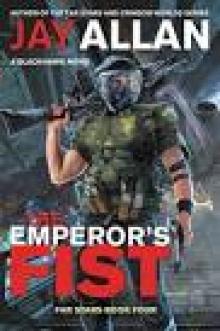 The Emperor's Fist
The Emperor's Fist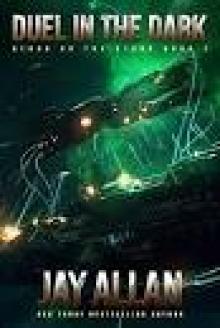 Blood on the Stars Collection 1
Blood on the Stars Collection 1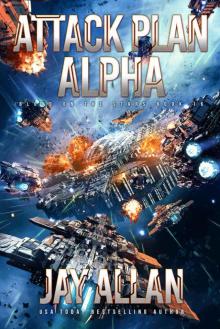 Attack Plan Alpha (Blood on the Stars Book 16)
Attack Plan Alpha (Blood on the Stars Book 16)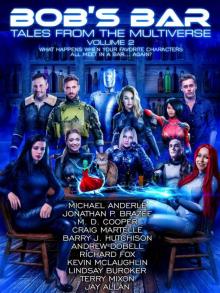 BOB's Bar (Tales From The Multiverse Book 2)
BOB's Bar (Tales From The Multiverse Book 2)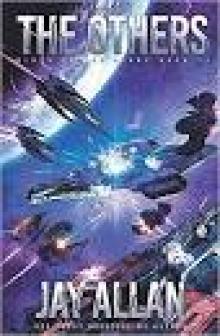 The Others
The Others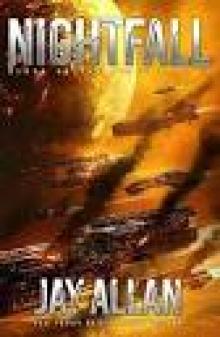 Nightfall
Nightfall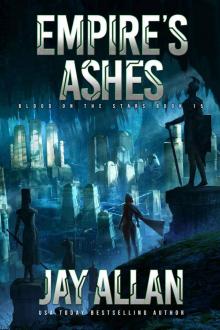 Empire's Ashes (Blood on the Stars Book 15)
Empire's Ashes (Blood on the Stars Book 15)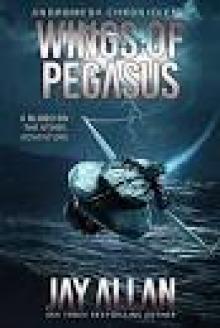 Wings of Pegasus
Wings of Pegasus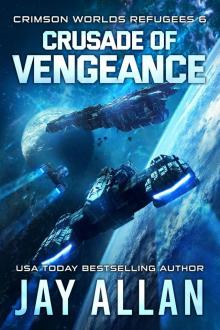 Crusade of Vengeance
Crusade of Vengeance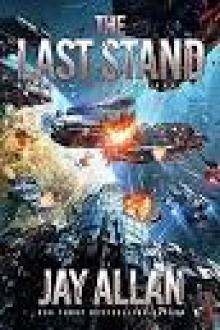 The Last Stand
The Last Stand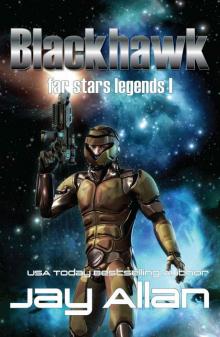 Blackhawk: Far Stars Legends I
Blackhawk: Far Stars Legends I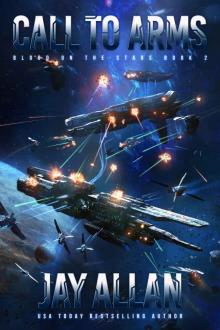 Call to Arms: Blood on the Stars II
Call to Arms: Blood on the Stars II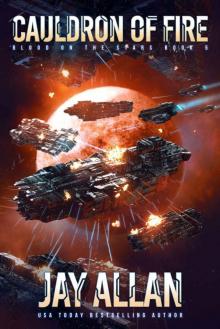 Cauldron of Fire (Blood on the Stars Book 5)
Cauldron of Fire (Blood on the Stars Book 5)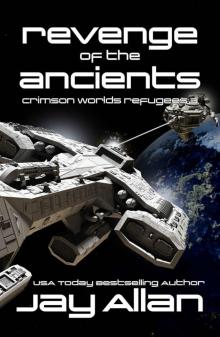 Revenge of the Ancients: Crimson Worlds Refugees III
Revenge of the Ancients: Crimson Worlds Refugees III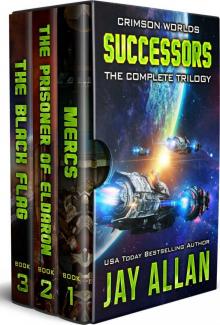 Crimson Worlds Successors: The Complete Trilogy
Crimson Worlds Successors: The Complete Trilogy The Grand Alliance
The Grand Alliance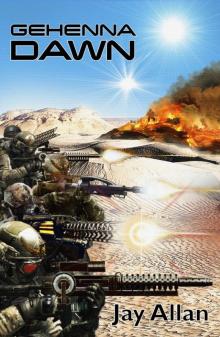 Portal Wars 1: Gehenna Dawn
Portal Wars 1: Gehenna Dawn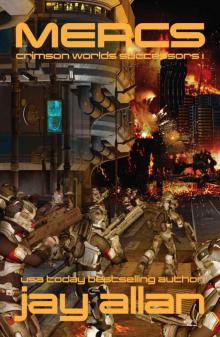 MERCS: Crimson Worlds Successors
MERCS: Crimson Worlds Successors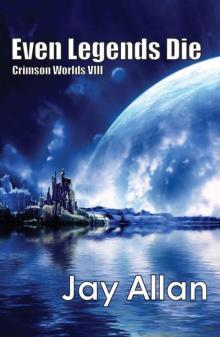 Crimson Worlds: 08 - Even Legends Die
Crimson Worlds: 08 - Even Legends Die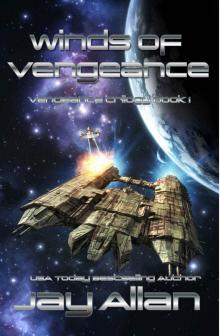 Winds of Vengeance
Winds of Vengeance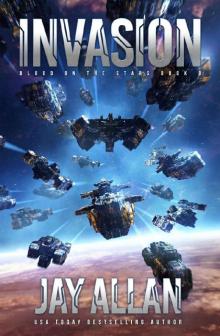 Invasion (Blood on the Stars Book 9)
Invasion (Blood on the Stars Book 9)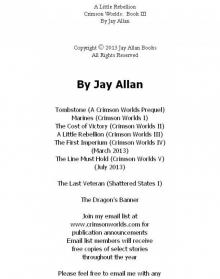 A Little Rebellion (Crimson Worlds III)
A Little Rebellion (Crimson Worlds III)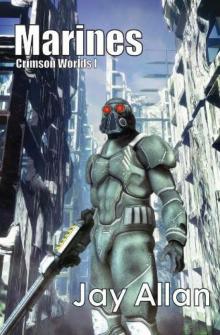 Marines
Marines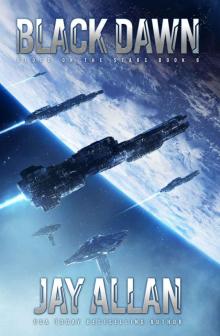 Black Dawn (Blood on the Stars Book 8)
Black Dawn (Blood on the Stars Book 8)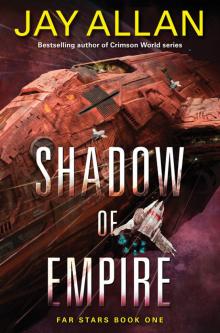 Shadow of Empire
Shadow of Empire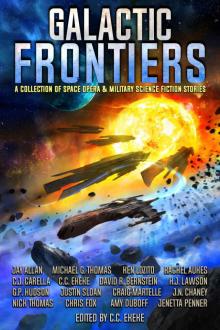 Galactic Frontiers: A Collection of Space Opera and Military Science Fiction Stories
Galactic Frontiers: A Collection of Space Opera and Military Science Fiction Stories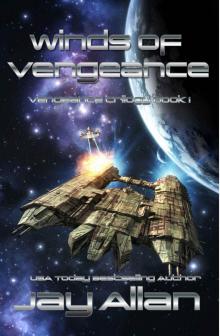 Winds of Vengeance (Crimson Worlds Refugees Book 4)
Winds of Vengeance (Crimson Worlds Refugees Book 4)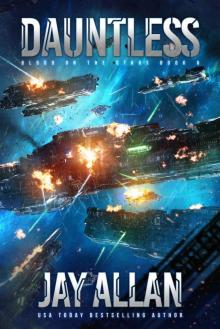 Dauntless (Blood on the Stars Book 6)
Dauntless (Blood on the Stars Book 6) Portal Wars: The Trilogy
Portal Wars: The Trilogy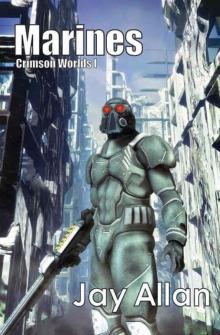 Marines cw-1
Marines cw-1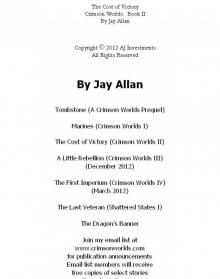 The Cost of Victory
The Cost of Victory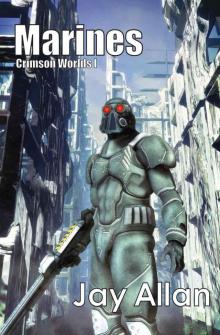 Marines (Crimson Worlds)
Marines (Crimson Worlds)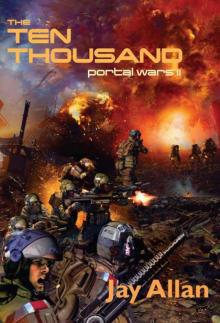 The Ten Thousand: Portal Wars II
The Ten Thousand: Portal Wars II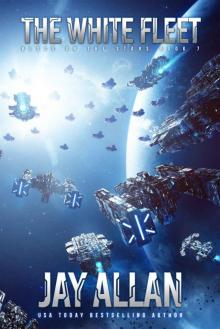 The White Fleet (Blood on the Stars Book 7)
The White Fleet (Blood on the Stars Book 7)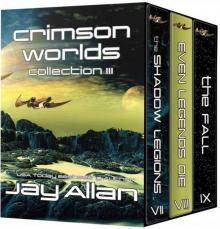 Crimson Worlds Collection III
Crimson Worlds Collection III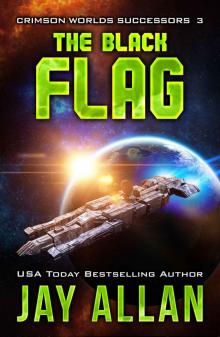 The Black Flag (Crimson Worlds Successors Book 3)
The Black Flag (Crimson Worlds Successors Book 3)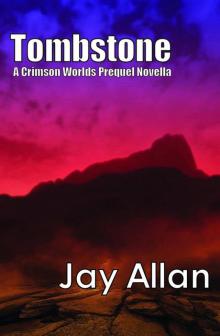 Tombstone
Tombstone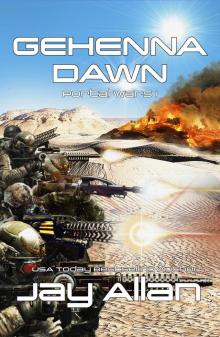 Gehenna Dawn
Gehenna Dawn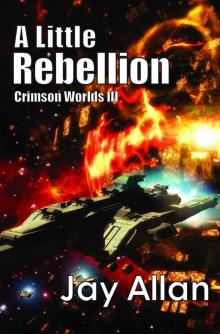 A Little Rebellion (Crimson Worlds)
A Little Rebellion (Crimson Worlds)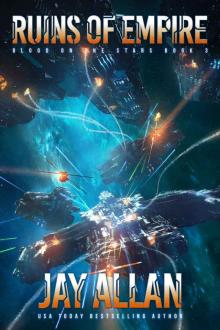 Ruins of Empire: Blood on the Stars III
Ruins of Empire: Blood on the Stars III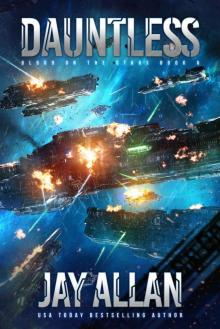 Dauntless
Dauntless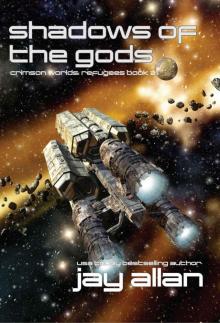 Shadows of the Gods: Crimson Worlds Refugees II
Shadows of the Gods: Crimson Worlds Refugees II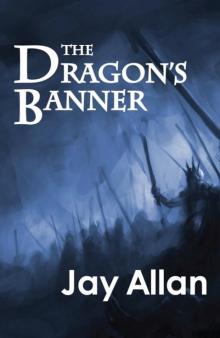 The Dragon's Banner
The Dragon's Banner Echoes of Glory (Blood on the Stars Book 4)
Echoes of Glory (Blood on the Stars Book 4)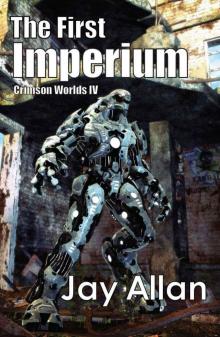 Crimson Worlds: 04 - The First Imperium
Crimson Worlds: 04 - The First Imperium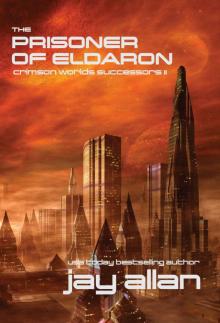 The Prisoner of Eldaron: Crimson Worlds Successors II
The Prisoner of Eldaron: Crimson Worlds Successors II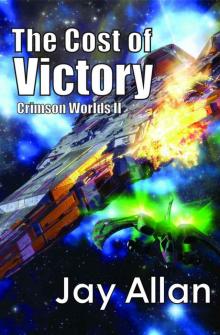 The Cost of Victory (Crimson Worlds)
The Cost of Victory (Crimson Worlds)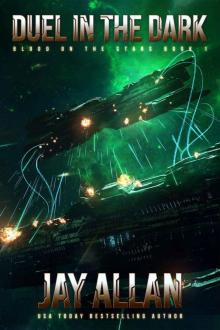 Duel in the Dark: Blood on the Stars I
Duel in the Dark: Blood on the Stars I Into the Darkness: Crimson Worlds Refugees I
Into the Darkness: Crimson Worlds Refugees I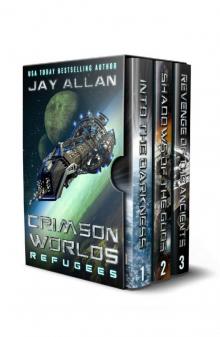 Crimson Worlds Refugees: The First Trilogy
Crimson Worlds Refugees: The First Trilogy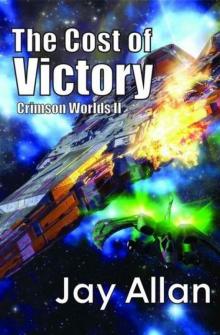 The Cost of Victory cw-2
The Cost of Victory cw-2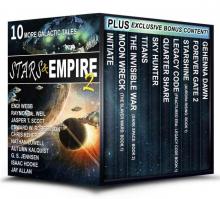 Stars & Empire 2: 10 More Galactic Tales (Stars & Empire Box Set Collection)
Stars & Empire 2: 10 More Galactic Tales (Stars & Empire Box Set Collection)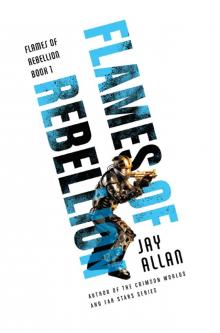 Flames of Rebellion
Flames of Rebellion Stars & Empire: 10 Galactic Tales
Stars & Empire: 10 Galactic Tales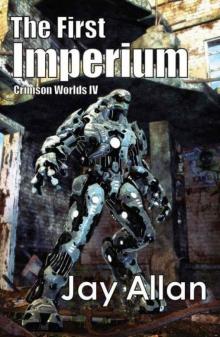 The First Imperium cw-4
The First Imperium cw-4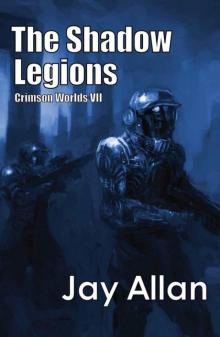 Crimson Worlds: 07 - The Shadow Legions
Crimson Worlds: 07 - The Shadow Legions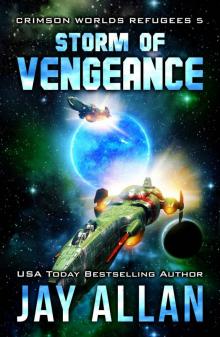 Storm of Vengeance
Storm of Vengeance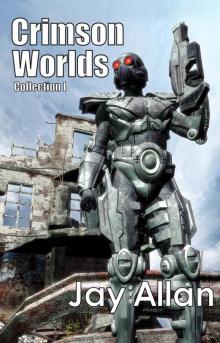 Crimson Worlds Collection I
Crimson Worlds Collection I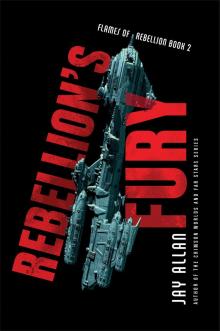 Rebellion's Fury
Rebellion's Fury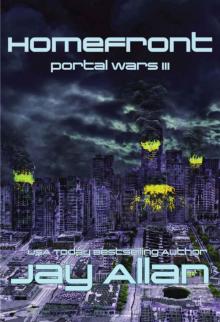 Homefront: Portal Wars III
Homefront: Portal Wars III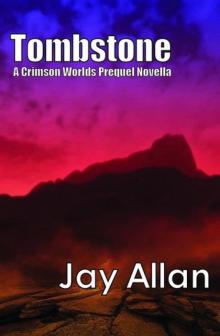 Tombstone (crimson worlds)
Tombstone (crimson worlds)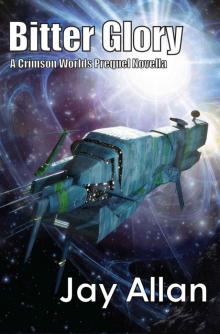 Crimson Worlds: Prequel - Bitter Glory
Crimson Worlds: Prequel - Bitter Glory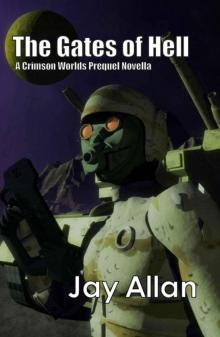 Crimson Worlds: Prequel - The Gates of Hell
Crimson Worlds: Prequel - The Gates of Hell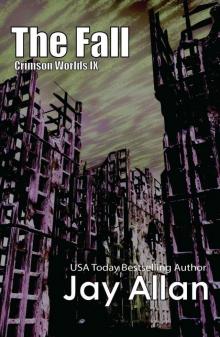 The Fall: Crimson Worlds IX
The Fall: Crimson Worlds IX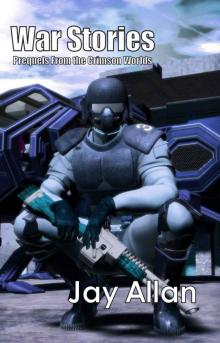 Crimson Worlds: War Stories: 3 Crimson Worlds Prequel Novellas
Crimson Worlds: War Stories: 3 Crimson Worlds Prequel Novellas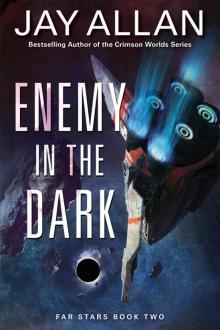 Enemy in the Dark
Enemy in the Dark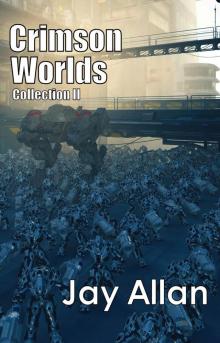 Crimson Worlds Collection II
Crimson Worlds Collection II